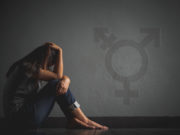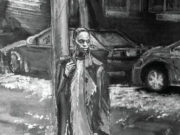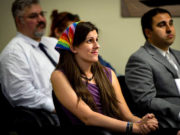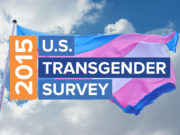GRIEF –I GRIEVE
Grief, like a cumulonimbus cloud, envelops my mind, body and spirit. I grieve at the loss of my missed girl-hood. I lost the house I renovated –I grieve. Two daughters claim my surname. They decided they wanted nothing to do with me. I grieve. I missed out on mother-daughter bonding, I grieve. I have grief for all the feminine experiences I missed between age 3 through age 47. Prom dresses, menstruation, birthing, teen crushes, bikini lines, wedding gown(s), ad infinitum. I am saddened that I do not ‘blend’ in as a natal female. That I haven’t those feminine ‘rites of passage’ females have as their birth right.
All those missed opportunities, simply because I am transgender, acted as my navigator through suicidal thoughts to attempts, to harbored thoughts of self-mutilation, to alcohol over indulgence, to substance experimentation. Those and more, several times over. Insecurities in my presentation, my pining for lost opportunities, relationships failed and relationships missed, genetic inheritances, cursed heredity, scars of my youth, and my current “focus du jour” fuel my grief.
My feelings of depression, the middle stage of grief, have intensified, again. Coming to roost like an irksome friend, again. An undulating ocean is my metaphor. This is not a new phenomenon. See, when in the tumultuous throes of grief, it is easy to focus on negative reinforcement. For me, grief is not a linear process. It waxes and wanes.
he sees all my non-natal female traits…he knows I am transgender. Will he ‘out’ me?
For instance, during a recent celebration, my struggles with my presentation flew out of control. I was being stared at and all I could think was, ‘he sees all my non-natal female traits…he knows I am transgender. Will he ‘out’ me’? That, on top of a woman sitting next to me, focusing too closely and doing double takes. My anger, second stage of grief, at not being born a female bore out in the form of paranoia at being “outed” (which did happen a year ago in the same Floridian town).
Disenfranchised Grief is defined as suffering a loss, unrecognized by society
According to psychological professionals, the specific type of grief I most align with is referred to as “Disenfranchised Grief.” Disenfranchised Grief is defined as suffering a loss, unrecognized by society. My “unrealized” losses are real to me. Some are not definitive losses, but fit the description. I identify the rejection of my daughters as a loss. Tougher to grieve than a loss, as they are still alive and I cope daily through my perpetual grieving process.
I see myself as a work in progress. My rational brain and my emotional brain conflict, as I fluctuate through my five stages of grief. I sought/seek comfort, by withdrawing emotionally and physically, as I navigated/navigate around my being transgender. Coping and defense mechanisms enabled/enable me to compartmentalize my grief.
According to modern psychology, grief has five stages:
- Denial/Numbness: protects the individual from the impact of the loss. This numbness enables the individual to cope with the initial impact of the tragedy and shouldn’t be confused with “not caring.”

- Anger: feelings of abandonment give rise to anger. The individual feels helpless and powerless, and may even exhibit resentment against their higher power.
- Bargaining: happens after the initial numbness wears off. Here the individual waffles around with thoughts of what could have been done to prevent the loss. Here immense feeling of guilt can anchor the individual, preoccupying them and preventing them from moving forward with healing.
- Depression: roots itself in the individual after the full extent of the loss is realized. Depression is ever pervading the individual. Sleep and appetite disruptions, lethargy, loneliness, self-pity, crying spells are among the signs of depression. This is the most difficult stage of grief. Many people do not come out of their depression on their own or at all.
- Acceptance: once an individual comes to terms with their feelings, acceptance of their loss can occur. Now the healing can begin and integrate the loss into the rest of their life.
The five stages of grief are not linear, and an individual can undulate through the stages throughout their grieving process. Intense grief will manifest as depression. When your daily life is affected, you abuse alcohol or other substances, or harbor feelings of suicide, it is time to seek professional help immediately.
Last year, Caitlyn Jenner reported 41% of transgender individuals attempted suicide at last year’s ESPYS speech. At this high a rate, it is an epidemic. Attempts are a cry for help. I’ve cried more than once. Grief in the transgender community is too under acknowledged. One successful suicide, is one too many.
There are healthy and unhealthy means of coping with grief.
As a transfemale, and a transgender advocate, I voluntarily shoulder the responsibility to help my trans sisters and brothers, especially when they are looking through the glass darkly. We are a strong community and we deserve to reap the happiness of this life we were given. By helping one person out of their doldrums, we help countless others, by extension. I have been the offerer, and the offered, in equal measure.
 My being transgender is the sole contributing factor to my grief. My being transgender will also be my phoenix. All my successes and failures, gains and losses are endemic of my being a transfemale. There is an luminous lining surrounding all of this grief. The prospect of coming through, stronger and wiser…again. I am not there yet, though.
My being transgender is the sole contributing factor to my grief. My being transgender will also be my phoenix. All my successes and failures, gains and losses are endemic of my being a transfemale. There is an luminous lining surrounding all of this grief. The prospect of coming through, stronger and wiser…again. I am not there yet, though.
If you feel daunted by grief, because you are transgender, and do not know where to get the support you need, the GLBT National Help Center is dedicated to supporting all members of the LGBT spectrum. They have a trans teens national weekly talk group, fully moderated by licensed professionals. They have a wealth of information, including a page to locate resources near you and a helpline.
A non-specific LGBT alternative, griefnet.org, is an online support group directed by licensed clinical psychologist, Cendra (Ken’dra) Lynn, PhD. Griefnet offers both kids and adult email support groups. However, this is not a dedicated LGBT support group.
mir, irini, peace, amn,
-jahn

































